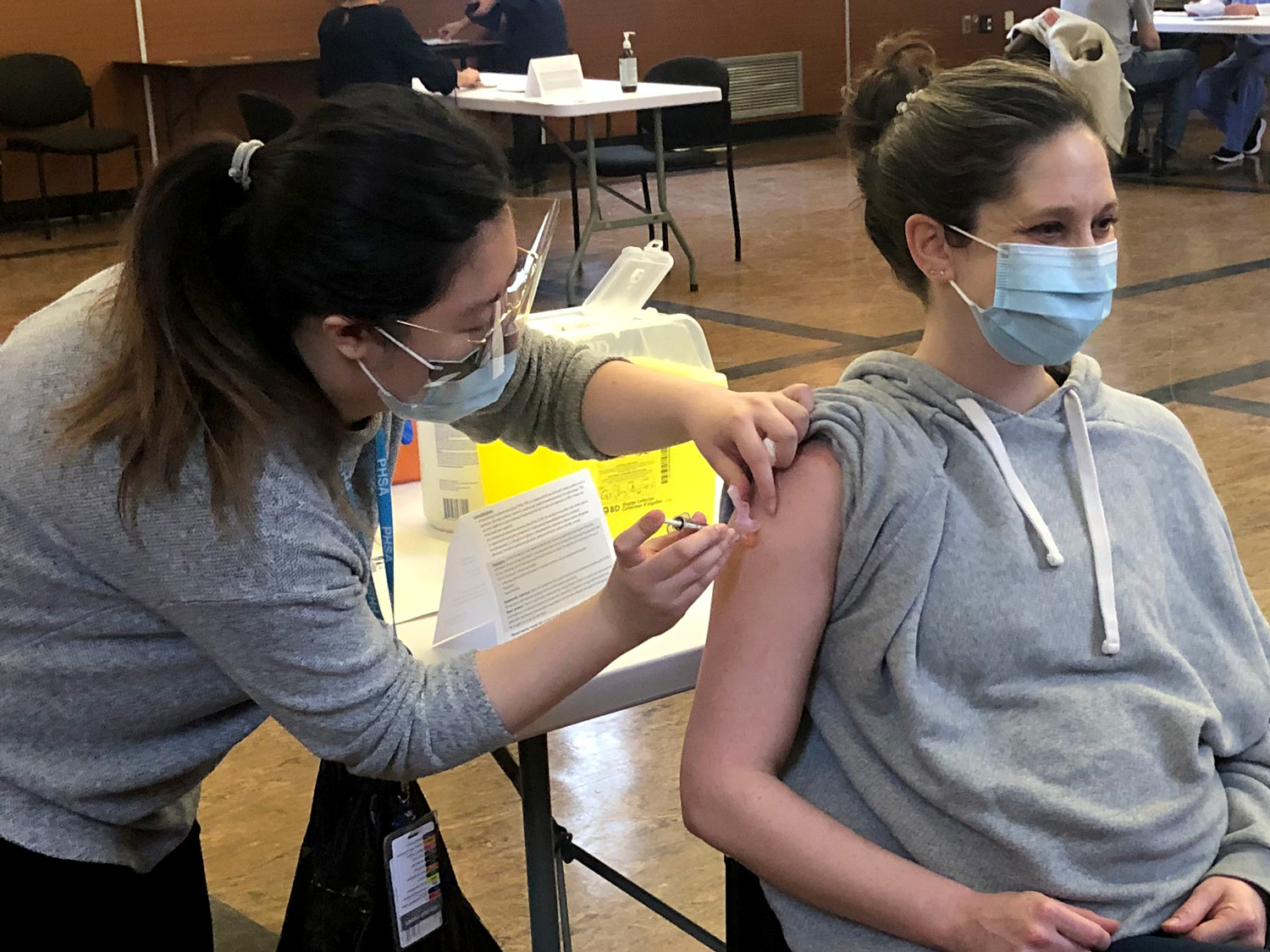“I was just really grateful to be given the opportunity to make my own decision about what was best for me and my baby,” says Gilley, an Emergency Department physician at BC Children's. “I elected to get the vaccine. This was supported by my health-care provider and the Society of Obstetricians and Gynaecologists of Canada (SOGC).”
Pregnant people age 16+ are eligible for the
COVID-19 vaccines as a priority population through B.C.’s Immunization Plan. Health experts in Canada and worldwide agree that getting a COVID-19 vaccine is a good choice for most pregnant and breastfeeding people. The SOGC says women who are pregnant or breastfeeding should be offered vaccination at any time during pregnancy, if they are eligible. The BC Centre for Disease Control (BCCDC) also recommends vaccination because it reduces the likelihood of getting COVID-19, which we know can be serious and even fatal.
 “The vaccines are recommended in any trimester or while breastfeeding,” says Dr. Chelsea Elwood, a reproductive infectious diseases specialist at BC Women’s Hospital + Health Centre. “The decision to be vaccinated for COVID-19 is up to each pregnant person, based on their own comfort, individual risk of getting COVID-19, and the chance that they may get seriously ill if they contract the virus.”
“The vaccines are recommended in any trimester or while breastfeeding,” says Dr. Chelsea Elwood, a reproductive infectious diseases specialist at BC Women’s Hospital + Health Centre. “The decision to be vaccinated for COVID-19 is up to each pregnant person, based on their own comfort, individual risk of getting COVID-19, and the chance that they may get seriously ill if they contract the virus.”
The COVID-19 vaccines currently available in Canada are very effective in preventing people from getting sick with COVID-19. The first dose of a COVID-19 vaccine can provide up to 92 per cent protection from symptomatic COVID-19 disease for at least three months, and close to 100 per cent protection against severe disease and death, according to effectiveness data out of the United Kingdom. A second dose provides up to 93 per cent protection.
 “I was weighing the very real risk of COVID-19 exposure and becoming significantly ill, given the fact that I was pregnant, versus the hypothetical risk of a vaccine.” says Gilley. “There’s excellent evidence of safety with other vaccines in pregnancy so I decided to get my COVID -19 vaccination.”
“I was weighing the very real risk of COVID-19 exposure and becoming significantly ill, given the fact that I was pregnant, versus the hypothetical risk of a vaccine.” says Gilley. “There’s excellent evidence of safety with other vaccines in pregnancy so I decided to get my COVID -19 vaccination.”
According to Immunize BC, most negative effects occur within six weeks of receiving a vaccine. Gilley was six months pregnant when she received her first dose of the Pfizer-BioNTech COVID-19 vaccine and eight months pregnant when she received her second dose. This was consistent with vaccination prioritization in B.C., as outlined on the BCCDC website.
“It was fine,” says Gilley. “I had a slightly sore arm after the first shot, but didn’t feel unwell. After the second shot, my arm was slightly more sore and I was perhaps a little more tired the next day, but it’s hard to say if that was just because I was in my third trimester. I had no adverse events with the vaccine and my baby is doing well.”
 Henry was born happy and healthy at the end of February and is now nearly two months old.
Henry was born happy and healthy at the end of February and is now nearly two months old.
“There is no known specific serious risk, like miscarriage or possible birth defect, for getting a COVID-19 vaccine while pregnant, to either the person being vaccinated or the child,” says Elwood. “Some early studies out of the U.S. have shown the vaccine is safe for pregnant people and can even pass COVID-fighting antibodies to the baby, in utero or through breastmilk.”
At the same time, we already know that being infected with COVID-19 can make people very sick, and it may make pregnant people even sicker. Early Canadian data has shown pregnant people who contract COVID-19 seem to have an increased risk of being hospitalized and being admitted to intensive care units. COVID-19 is also associated with an increase in preterm births (before the 37th week of pregnancy) in Canada.
Pain at the injection site, fatigue or fever are common after receiving a COVID-19 vaccine. Fever in pregnancy or when breastfeeding can be managed safely by taking acetaminophen (Tylenol®).
Those concerned about this side effect should discuss their concerns with their care provider.
“There are some pregnant people who may be hesitant about getting the COVID-19 vaccine. They should seek out answers to their questions from reliable sources of information, like their family doctor, maternity care provider and/or public health immunizer,” says Elwood.
To register for a COVID-19 vaccine, see How to get vaccinated for COVID-19. Perinatal Services BC (PSBC) has a helpful handout for planning for a vaccine. The BC Women’s website has more information on COVID-19 for patients. The BCCDC also has a variety of information about pregnancy and the COVID-19 vaccine on its website.
